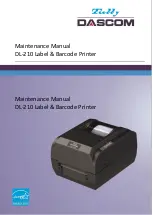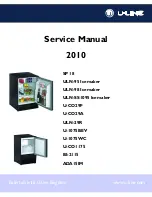
86
A-Class
5. Tighten the Locking Screws until ‘snug’ (that is, tight enough to remove any play in the
printhead assembly, yet loose enough to allow the Adjustment Screws to move the
printhead).
6. Turn each Adjustment Screw clockwise about a ¼ turn (and 1/8 a turn for finer
adjustments). Typically, thick media requires a slight forward adjustment, while thin
media requires a backward adjustment. Print another Validation Label and examine the
print quality. Repeat Step 6 (see note below) until labels are produced that meet
conformance as well as aesthetic standards.
;
When the Locking Screws are ‘snug’, turning the Adjustment Screws
counterclockwise will NOT move the printhead outward. If the printhead is
adjusted too far inward, restart the entire procedure beginning at Step 2.
7. Tighten the Locking Screws. Print a final Validation Label to verify the adjustment.
5.4 Printhead Replacement
•
Use extreme care when handling the printhead; wear a wrist strap and
follow standard ESD prevention procedures.
•
(2) If 24V OUT OF TOLERANCE is displayed (see Section 6.1.2), contact a
qualified technician or Datamax
Technical Support before proceeding.
Replace the printhead as follows:
1.
Turn OFF the printer. Raise the Access Cover.
2.
Touch a bare metal part of the printer’s frame to discharge any static electricity that
may be present on your body. Unplug the printer.
3.
With the Printhead Assembly in the down position, loosen the Captive Screw(s). Remove
the Pivot Screw and Washers that secure the Printhead Assembly. The following
drawings highlight the location of these components according to printer model:
Summary of Contents for A-Class A-4212
Page 1: ...Operator s Manual ...
Page 2: ......
Page 5: ......
Page 6: ......
Page 8: ......
Page 14: ...vi ...
Page 22: ...8 A Class ...
Page 84: ...70 A Class ...
Page 128: ...114 A Class ...
Page 136: ...122 A Class ...
Page 140: ...126 A Class ...
Page 144: ...130 A Class ...
Page 158: ...144 A Class ...
Page 160: ...146 A Class ...
Page 166: ...152 A Class ...
















































